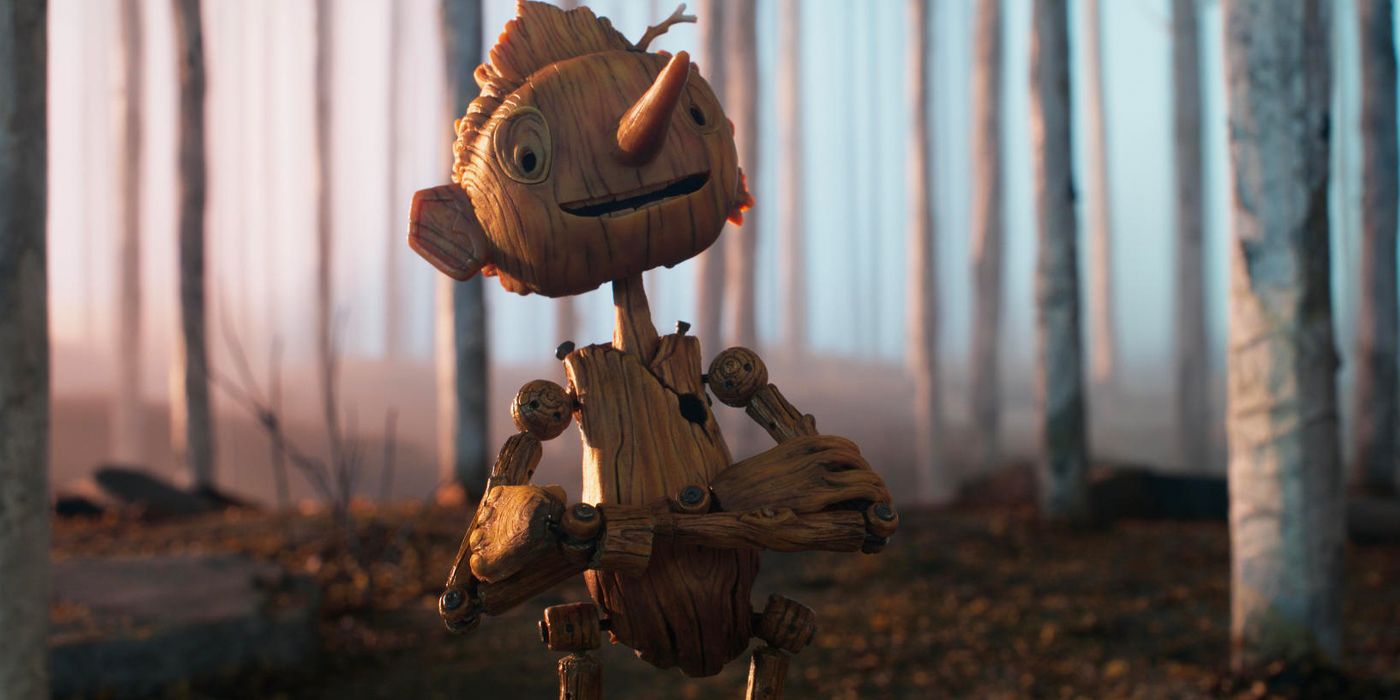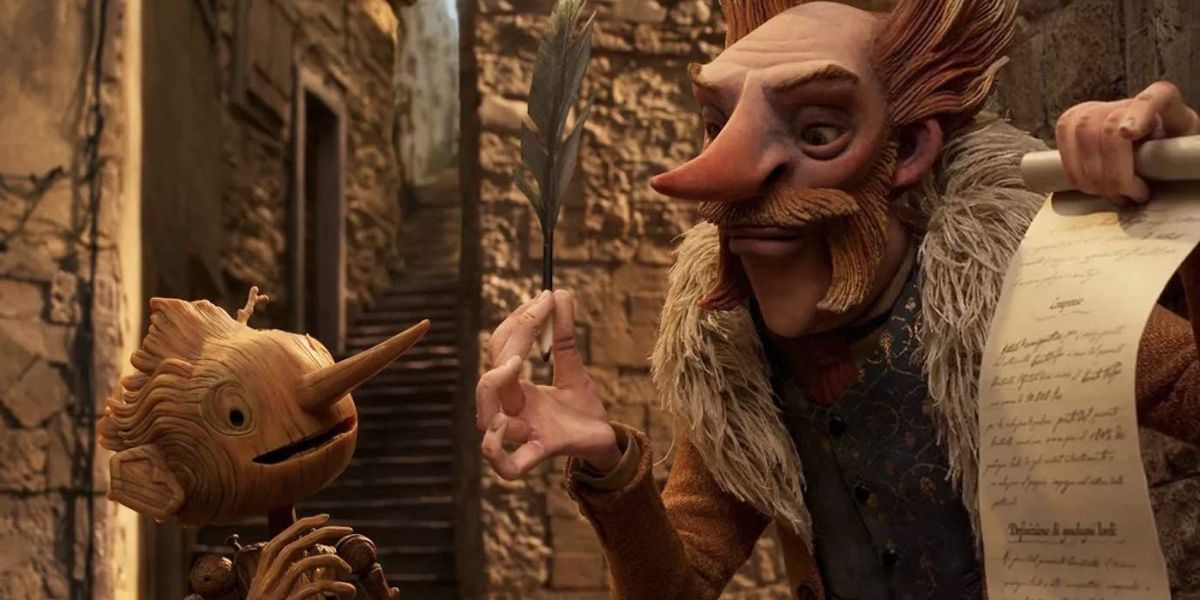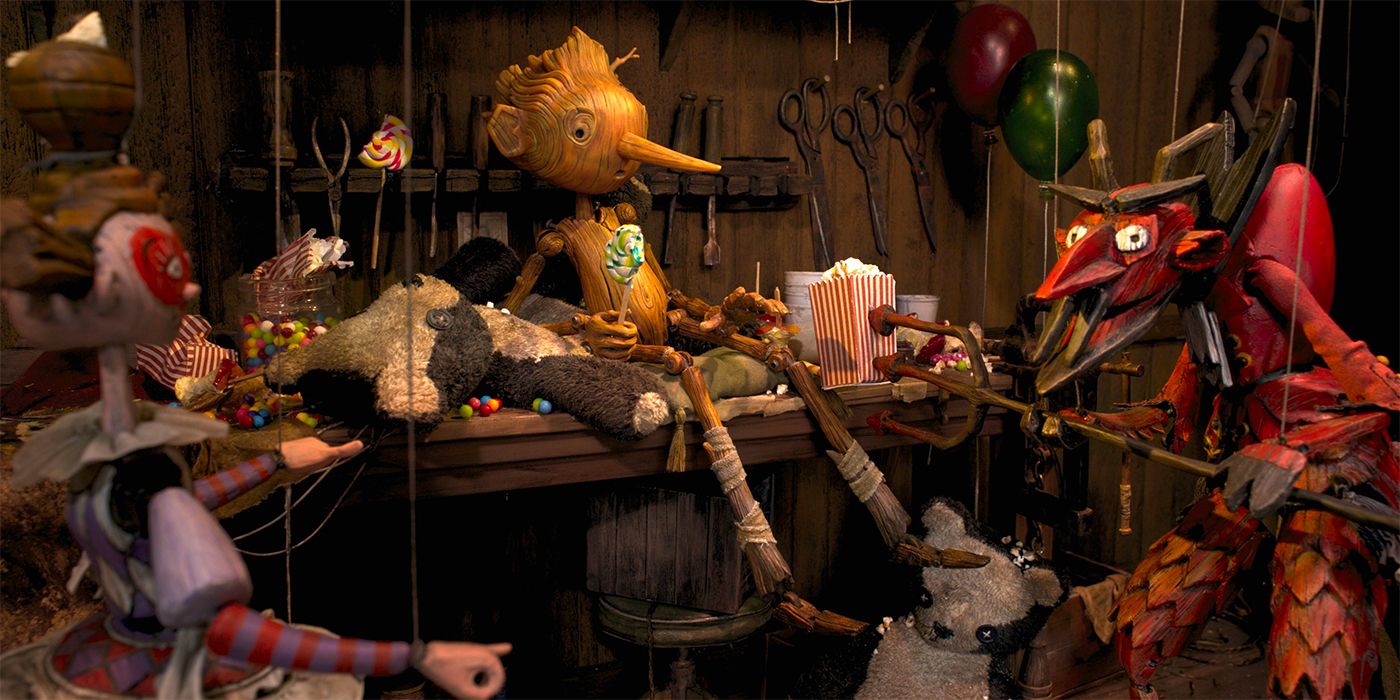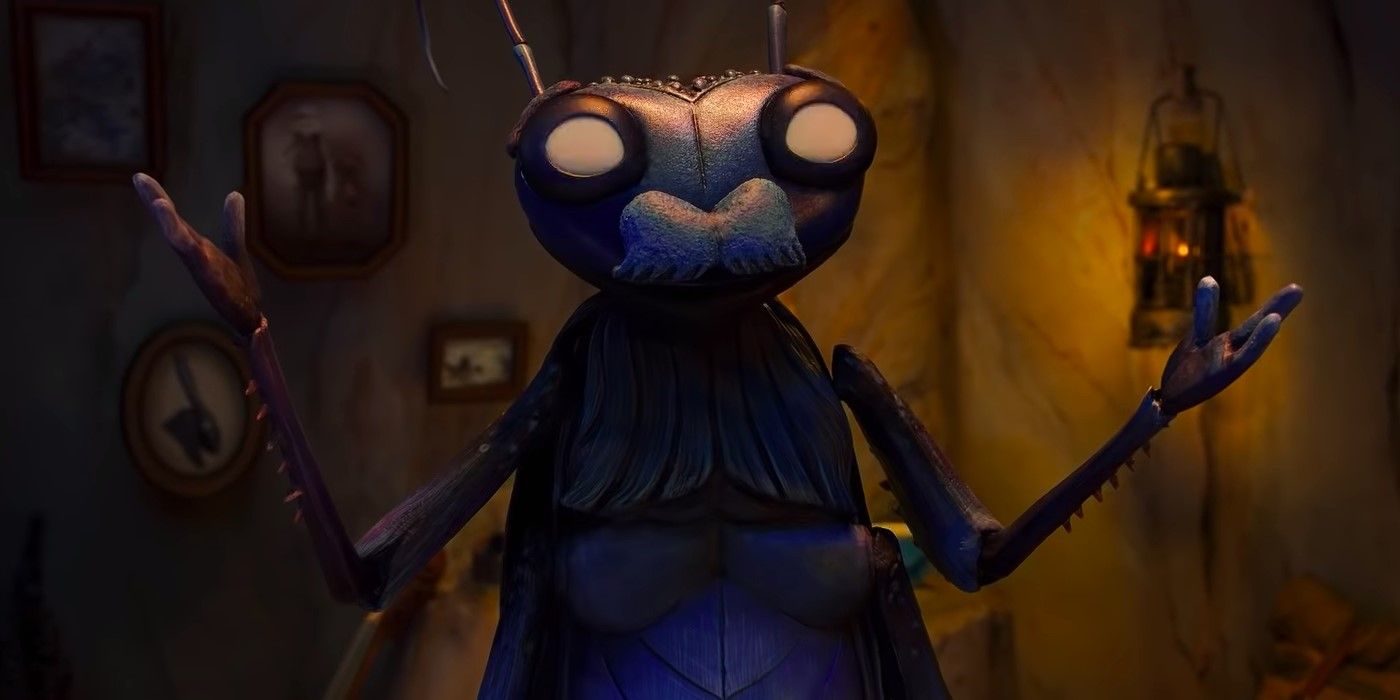Editor's Note: The following contains spoilers for Guillermo del Toro's Pinocchio.As any fan of Guillermo del Toro’s knows very well, there is a fundamental difference between a “children’s story” and a narrative told from a child’s point of view. Pan’s Labyrinth explores loss, war, and imperialism through the eyes of a child, and even Hellboy opens with a flashback to the titular character during his youth. Del Toro understands that what scares us as children will also terrify us as adults, and he uses a deceptively simple approach in his breathtaking version of Pinocchio. You may think that you know the story, but del Toro’s vision is much deeper and darker than any version that you’ve seen before.
Inspired by Gris Grimly's concepts in the 2002 version of the 1883 Italian novel The Adventures of Pinocchio, del Toro’s motion capture adventure grounds itself in the novel’s original setting of fascist Italy. While Robert Zemeckis’ recent Disney+ adaptation depicted Gepetto’s mourning for his son as tawdry melodrama, del Toro explores how the heartbroken woodcarver (voiced beautifully by David Bradley) attempts to revive the child that he knows that he’ll never see again. Pinocchio himself (voiced by talented newcomer Gregory Mann) is a timeless being that was made to replace something that is lost forever.
What is the ethical justification for playing God and creating life, and is Pinocchio’s immortality a curse or a gift? Del Toro dexterously explores these issues as he wrestles with themes of nurture and nature. Pinocchio is intended to serve as Gepetto’s child, and thus he retains a childlike innocence for his entire life. While he may have been taught lessons of compassion from his pseudo-father, it makes Pinocchio an anomaly in the mortal world. Del Toro questions whether or not this story is an endearing one at all; it’s safe to say that his Pinocchio is far more than just a puppet.
Pinocchio Is Raised as Ignorant of the Real World
Pinocchio is raised in isolation by Gepetto and Sebastian J. Cricket (Ewan McGregor); while Gepetto does this out of kindness, he’s aware that Pinocchio would be mocked and scorned if he ever went out in public. There’s a selfishness to his actions that are somewhat disturbing; Pinocchio is raised without knowledge of the cruelty of the world, and one day, he will not have Geptto’s kindness to shield him anymore. Even if Gepetto intended for Pinocchio to replace his son, he surely would have watched his son grow up and have his own family if he had lived past childhood. However, these prospects are impossible for Pinocchio.
This youthful ignorance that Pinocchio is given is easily taken advantage of when he ventures out into the Italian villa. It doesn’t take long before his talents are noticed by the scheming ringmaster Count Volpe (Christoph Waltz), who revels in getting to show off Pinocchio as a toy. He’s someone who takes advantage of those that are viewed as “different,” and treats them as a spectacle. Of course, Pinocchio is too innocent to suspect his malicious intentions, and he signs a deal with the deceptive ringmaster.
Gepetto may be heartbroken, but sadly, Pinocchio doesn’t know any different. He even somewhat enjoys his work for Volpe, as his very existence is based on serving others. The sad thing is that Pinocchio wouldn’t even have the autonomy to make a different choice if he wanted to; he obviously cannot lie without being discovered. Del Toro shows Pinocchio’s nose with a body horror reminiscent of Frankenstein or The Fly.
Pinocchio Doesn't Shy Away From Criticizing Fascist Italy
Another theme that del Toro tackles in his study of parentage are whether bringing a child into an evil world is justified. The backdrop of fascism surrounds Pinocchio’s childhood, and even though his village is relatively peaceful, it’s only a matter of time before it's compromised by the government official Podestà (Ron Perlman). During war, scientists, inventors, and artists are utilized by violent forces to use their talents for destruction and fear; like so many normal children, Pinocchio is told to strip himself of humanity in order to serve as a soldier.
It’s disheartening to see that Pinocchio’s only interaction with other children comes during his military training. However, we also see the benefits that his eternal naïveté has through his relationship with Podesta’s son, Candlewick (Finn Wolfhard). Candlewick isn’t malicious, but he’s been taught to hate others by his child, and fears that anything less than his unflinching brutality would be viewed as weak by his father. Similar to how Pinocchio’s innocence is tied to Gepetto’s paternal love, Candlewick’s viciousness is tied to his terror.
However, del Toro shows that even if Pinocchio isn’t able to change his nature, mortal characters can. Candlewick learns to care for Pinocchio and expresses joy when they present their joint victory in a wartime simulation to Podesta. Candlewick is shown compassion for the first time, and he embraces it. He bravely learns that his father is wrong and stands up to him; it's important to see that even bullies are capable of redemption.
Del Toro Contemplates Humanity and Morality in Pinocchio
The story is narrated by Cricket, and so it ends with the death of Pinocchio’s most loyal friend. Cricket has concerns about Pinocchio’s life following both his death and Gepetto’s, but he ends the film with an upbeat monologue about his sense of hope. It’s an interesting note to end the story on; it’s very clear that this is Cricket’s version of events, and that Pinocchio’s story is just beginning. We have no idea how he will fare in the life he has after all of his friends and family have passed on.
The somewhat ambiguous closure to the story serves as an indicator of where the audience stands on humanity’s nature. Del Toro doesn’t offer a firm determination either way; perhaps Pinocchio is able to spread cheer and joy in the 20th century, but perhaps he will live to see countless other wars and massacres. In a brilliant way, del Toro crafts a story that may resonate differently with audiences of different ages.
Pinocchio is both a loving tribute to the original source material and a brilliant work of literary criticism. Del Toro’s production design and composition are unparalleled by any of his contemporaries, but it's his thoughtful contemplation of morality that makes Pinocchio an instant classic. Ironically, it’s a story of a puppet that is more human than anything.




